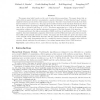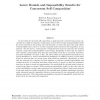16 search results - page 3 / 4 » Lower bounds for Quantum Oblivious Transfer |
CRYPTO
2009
Springer
14 years 19 days ago
2009
Springer
We consider two-party quantum protocols starting with a transmission of some random BB84 qubits followed by classical messages. We show a general “compiler” improving the secur...
JOC
2007
13 years 6 months ago
2007
This paper is about the Oblivious Transfer in the distributed model proposed by M. Naor and B. Pinkas. In this setting a Sender has n secrets and a Receiver is interested in one o...
EUROCRYPT
1999
Springer
13 years 10 months ago
1999
Springer
We consider the problem of basing Oblivious Transfer (OT) and Bit Commitment (BC), with information theoretic security, on seemingly weaker primitives. We introduce a general model...
FOCS
2003
IEEE
13 years 11 months ago
2003
IEEE
This paper gives tight bounds on the cost of cache-oblivious searching. The paper shows that no cache-oblivious search structure can guarantee a search performance of fewer than l...
JOC
2008
13 years 6 months ago
2008
In the setting of concurrent self composition, a single protocol is executed many times concurrently by a single set of parties. In this paper, we prove lower bounds and impossibi...



